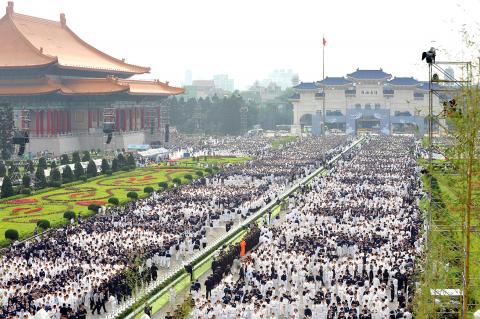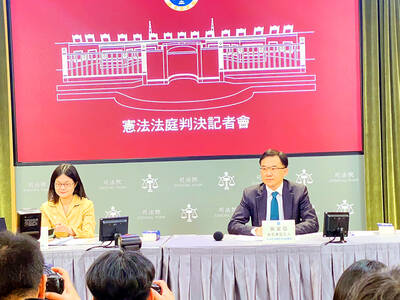Buddhists, politicians and diplomats gathered in front of the Presidential Office yesterday to celebrate Mother’s Day and the 2,633rd birthday of Sakyamuni Buddha.
Thousands gathered on Ketagalan Boulevard on what was the third time the annual event had been held outside the Presidential Office.
This was also the first time President Ma Ying-jeou (馬英九) did not personally attend the event.

Photo: Patrick Lin, AFP
Ma, who was in Greater Tainan in the morning, phoned in and gave his greetings, which were broadcast to the crowd.
Vice President Vincent Siew (蕭萬長), who attended the event on Ma’s behalf, said the occasion held profound significance as it commended the benevolence of Sakyamuni Buddha and recognized the devotion of all mothers.
“We also want the world to see Taiwan’s democracy, freedom and vibrant development of religion,” he said.
The legislature approved a proposal in 1999 to designate the birthday of Sakyamuni Buddha — which falls on the eighth day of the fourth month of the lunar calendar — a national holiday and to celebrate the special occasion concurrently with International Mother’s Day, which is celebrated on the second Sunday of May.
Siew urged the public to practice the “three acts of goodness” and the “five harmonies,” adding that if such universal values could reach every corner of the planet, the world would be a better place.
The “three acts of goodness” refer to doing good deeds, saying good words and having good intentions. The “five harmonies” refer to being kind to oneself, sensitive to one’s family, generous to friends, devoted to social harmony and committed to world peace.
The event was organized by the Fo Guang Shan Foundation.
Marking the Bathing Buddha Festival, Master Hsing Yun (星雲法師), founder of the Fo Guang Shan Monastery, led participants in performing the “bathing Buddha” ritual where he held a wooden ladle and poured water over a small statue of the Buddha.
Bathing a statue of the Buddha symbolizes a fresh start in life and the care given to newborns. Legend has it that when the Supreme Buddha, Siddhartha Gautama, was born, there were auspicious signs heralding his birth. They describe the sky as blue and clear on his birth, with dragons spurting purified water to bathe him. Since then, Buddhists have celebrated their religion’s founder’s birthday by using fragrant water to bathe the image of Buddha.
Master Hsing Yun said people bathing today were cleansing the impurities of anger and hatred from their minds.
Master Hsing Yun said that Sakyamuni Buddha is a human being, not a god, as a god has emotions.
A god punishes and rewards, “but a Buddha does not do that,” he said.
What a mother gives to her child, he said, is compassion, wisdom, tolerance, generosity and the ability to discipline and guide oneself. As long as a person can discover these treasures, that person could make the best of himself or herself, he said.
A Japanese lawmaker from Yamanashi Prefecture presented a thank-you certificate to Master Hsing Yun issued by Sadakazu -Tanigaki, president of Japan’s Liberal Democratic Party, to thank Taiwan for the NT$5.8 billion (US$1.8 billion) in cash donations and 500 tonnes of provisions given to the country in the wake of the March 11 earthquake and tsunami.

The US government has signed defense cooperation agreements with Japan and the Philippines to boost the deterrence capabilities of countries in the first island chain, a report by the National Security Bureau (NSB) showed. The main countries on the first island chain include the two nations and Taiwan. The bureau is to present the report at a meeting of the legislature’s Foreign Affairs and National Defense Committee tomorrow. The US military has deployed Typhon missile systems to Japan’s Yamaguchi Prefecture and Zambales province in the Philippines during their joint military exercises. It has also installed NMESIS anti-ship systems in Japan’s Okinawa

TRAGEDY STRIKES TAIPEI: The suspect died after falling off a building after he threw smoke grenades into Taipei Main Station and went on a killing spree in Zhongshan A 27-year-old suspect allegedly threw smoke grenades in Taipei Main Station and then proceeded to Zhongshan MRT Station in a random killing spree that resulted in the death of the suspect and two other civilians, and seven injured, including one in critical condition, as of press time last night. The suspect, identified as a man surnamed Chang Wen (張文), allegedly began the attack at Taipei Main Station, the Taipei Fire Department said, adding that it received a report at 5:24pm that smoke grenades had been thrown in the station. One man in his 50s was rushed to hospital after a cardiac arrest

ON ALERT: Taiwan’s partners would issue warnings if China attempted to use Interpol to target Taiwanese, and the global body has mechanisms to prevent it, an official said China has stationed two to four people specializing in Taiwan affairs at its embassies in several democratic countries to monitor and harass Taiwanese, actions that the host nations would not tolerate, National Security Bureau (NSB) Director-General Tsai Ming-yen (蔡明彥) said yesterday. Tsai made the comments at a meeting of the legislature’s Foreign Affairs and National Defense Committee, which asked him and Minister of National Defense Wellington Koo (顧立雄) to report on potential conflicts in the Taiwan Strait and military preparedness. Democratic Progressive Party (DPP) Legislator Michelle Lin (林楚茵) expressed concern that Beijing has posted personnel from China’s Taiwan Affairs Office to its

‘ILLEGAL RULING’: The KMT and the TPP slammed the Constitutional Court judgement, saying it contravened the law and was trying to clear the way for a ‘green dictatorship’ The Constitutional Court yesterday ruled that amendments to the Constitutional Court Procedure Act (憲法訴訟法) passed by the Legislative Yuan last year are unconstitutional, as they contravene due legislative process and separation of powers. The Legislative Yuan on Dec. 20 last year passed amendments stipulating that no fewer than 10 grand justices must take part in deliberations of the Constitutional Court, and at least nine grand justices must agree to declare a law unconstitutional. The Executive Yuan on Jan. 2 requested that lawmakers reconsider the bill, but the Legislative Yuan, under a combined majority of Chinese Nationalist Party (KMT) and Taiwan People’s Party